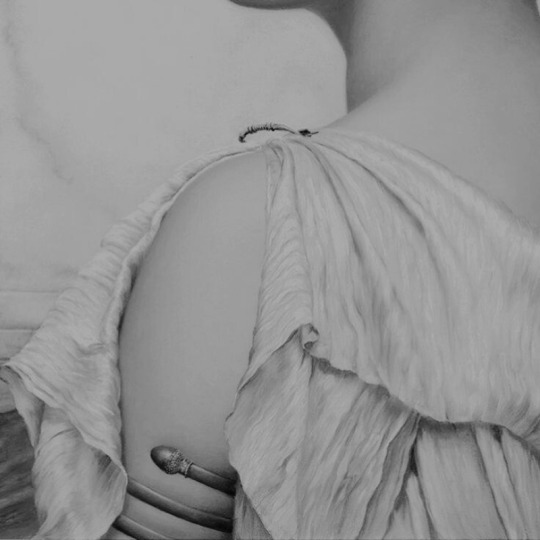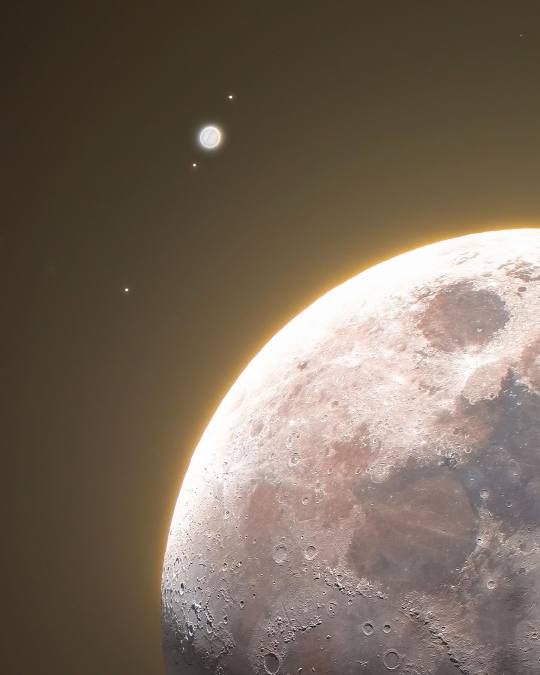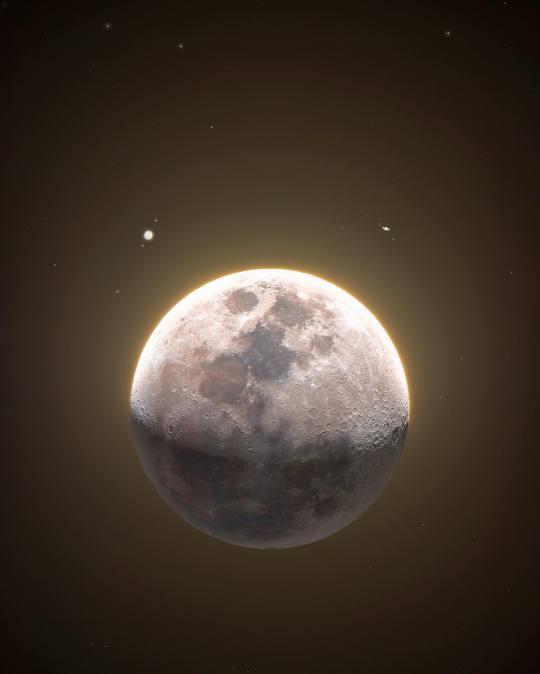#dione
Explore tagged Tumblr posts
Text
No se a quien diablos intento engañar. Si desaparezco o no, daría igual, no cambiaría nada para nadie; de hecho puedo asegurar que ni siquiera notarían que me fui.
#pensamientos#letras#notas#escritos#citas tristes#soledad#notas tristes#tristeza#dione.#dione#cosas del corazón#corazón roto#mente solitaria#una chica solitaria#solitaria#mente depresiva#depresión#nostálgica#nostalgia#ansiedad#desamor#ausencia#despedida#dolor del alma#sentimientos#notas de dolor#corazon roto#corazon herido
32 notes
·
View notes
Text

A silhouetted Dione in front of Saturn imaged by Cassini on December 20, 2010. This image captured from 263,000 km away. The bands on the left are Saturn's rings.
Credit: Jason Major
3K notes
·
View notes
Text

Dione & Mebby
For @constellor!
778 notes
·
View notes
Text

Saturn, as seen from Dione, illustrated by Chesley Bonestell, 1967.
472 notes
·
View notes
Text

regret elevator oc :)
75 notes
·
View notes
Text





paintings of saturn's moons 🌙 | goldenbrushstroke on ig
#stim#moons#space#paintings#sfw#grey#gray#black#blue#white#in order:#mimas#rhea#tethys#enceladus#dione#astronomy#art#saturn's moons#hands#ishy gifs#postish
220 notes
·
View notes
Text









greek mythology: dione
dione was the titan goddess of the oracle of dodona in thesprotia, and the mother of aphrodite by zeus. her name is simply the feminine form of zeus. dione was described as "the temple associate" of zeus at dodona. the three elderly prophetesses of the shrine, known collectively as the peleiades, were probably her priestesses. these women were named "the doves" after the sacred bird of dione's daughter aphrodite who also posssessed a temple at the shrine.
278 notes
·
View notes
Text
🔥 Campfire – A Quiet Glimpse
Just posted a quiet campfire scene over on Patreon - featuring the five core rebels of Echoes of Olympus.
It’s completely free to read for anyone following the project there - no paid membership required.
If you’d like a small, spoiler-light glimpse of how they talk, tease, and exist together - outside the battlefield - you’re more than welcome to take a look.
Each of them will get their proper introduction in the story itself, right where it belongs.
But this?
This is just a shared fire. Some burnt bread. A moment in between.
Link (for anyone interested): patreon.com/FableForge916
#echoes of olympus#interactive fiction#ifgames#choice based games#mythology#greek mythology#character interaction#original characters#rebel characters#campfire scene#alexos#dione#thera#zephyra#rhaelos#free to read#patreon update#choicescript#character driven#romance game#theron#alexa#rhaela#zephiron#dorian
20 notes
·
View notes
Text
The Iliad, book 5, line 406–415
νήπιος, οὐδὲ τὸ οἶδε κατὰ φρένα Τυδέος υἱὸς ὅττι μάλ᾽ οὐ δηναιὸς ὃς ἀθανάτοισι μάχηται, οὐδέ τί μιν παῖδες ποτὶ γούνασι παππάζουσιν ἐλθόντ᾽ ἐκ πολέμοιο καὶ αἰνῆς δηϊοτῆτος. τὼ νῦν Τυδεΐδης, εἰ καὶ μάλα καρτερός ἐστι, 410 φραζέσθω μή τίς οἱ ἀμείνων σεῖο μάχηται, μὴ δὴν Αἰγιάλεια περίφρων Ἀδρηστίνη ἐξ ὕπνου γοόωσα φίλους οἰκῆας ἐγείρῃ κουρίδιον ποθέουσα πόσιν τὸν ἄριστον Ἀχαιῶν ἰφθίμη ἄλοχος Διομήδεος ἱπποδάμοιο. 415 Fool—the son of Tydeus, down in his heart he knows not That verily he who fought with gods will not live long, Nor would his children call him “papa” by his knees Upon coming back from war and dreadful battle. So now let the son of Tydeus, for so mighty as he is, Beware, in case anyone better than you attacks him: Not before long Aegialeia—prudent daughter of Adrestus, Wake up from sleep mourning in her house for her love, Yearning for her wedded husband, the best of Achaeans— Even she, steadfast wife of Diomedes tamer of horses!
Notes:
δηναιός: “long-lived”, basically δην- (long) plus -αιος (suffix added with the sense of “belonging to”). Here when you look at the text: οὐ δην(αιός) in line 407 is actually resembling μὴ δήν in line 412, both denying the lasting of time.
παππάζουσιν: as you can see, the verb παππάζω (pappazo) comes from the noun παππάς (pappas), very onomatopoeic. It means “prattle, call someone ‘papa’”. And I just can’t get over this because it being used here just hurts so much…gets me every time.
μή τίς: here specifically, “in case anyone”, since there is the subjunctive μάχηται (should he attacks) being used with the phrase. Also for reasons I believe Homer is using another wordplay here: when joined together, μήτις means “no one”. And if you put this in the context: Dione (Aphrodite’s mother in the Iliad) telling Aphrodite “no one is better than you”, as in a mother telling her daughter who just got hurt that “you’re the best”, as comfort.
μὴ δήν: “not in a long while”. So I’ve seen translations that take δήν (long, for a long while) as δή (indeed, verily) but they’re in fact different words. Also look, another wordplay: when put together, this is part of Diomedes’s name: (Διο)μήδην (accusative form). It’s like having Aegialeia as “part of Diomedes”.
περίφρων: “prudent, wise”, characteristic epithet for Penelope—a prudent woman who’d rather trick her suitors for three years straight for her husband to return, instead of consorting with them. Here, it’s used for Aegialeia. Let it sink in.
γοόωσα: “wail, weep, mourn”. Could it be she’s mourning for Diomedes’s potential death if it ever happens that someone better than Aphrodite attacks him? Could it be she’s weeping for Diomedes just because she’s “yearning for her wedded husband”? (I’d say, both.)
ἐγείρῃ: “rouse, wake up”. The same form corresponds to a few grammatical cases for the verb but 3rd person singular subjunctive active fits both grammatically and contextually here. It means “should she wake up”, and combined with μὴ δήν at the start of this sentence, “it would not be long should she wake up (from sleep weeping)”.
ἰφθίμη: “steadfast, stately”. It’s used for somebody stalwart to someone else. It’s also used for women being stately and comely. Apparently in Homer’s point of view a woman being stalwart contributes to her comeliness. And here, it’s used for Aegialeia. Let it sink in.
Διομήδεος ἱπποδάμοιο: “Diomedes tamer of horses”. Being in genitive form, this naturally comes along with ἄλοχος (wife) meaning “wife of Diomedes tamer of horses”, instead of with ἄριστον Ἀχαιῶν (best of Achaeans) which is in accusative form here—that doesn’t fit grammatically. So can we just talk about how Homer used the flexibility of Ancient Greek grammar to separate line 412 and 415 when they could totally stick together, to put “wife of Diomedes tamer of horses” at the end of the sentence, not only to contrast with πόσιν (husband) in the previous line, but also to emphasize Aegialeia’s identity as, “steadfast wife of Diomedes tamer of horses”. Which is a bad*ss line drop just like “χερσὶ δαμέντ᾽ Ἀχιλῆος ἀμύμονος Αἰακίδαο.” from book 16 (line 854)—“overpowered in the hands of Achilles blameless grandson of Aeacus!”
#tagamemnon#ancient greek#my translation#the iliad#diomedes#aegialea#aphrodite#dione#homer’s iliad#homer#classics tag#greek mythology#the epic cycle#lyculī sermōnēs
49 notes
·
View notes
Photo





“ Moon and the two giants “ // Rami Ammoun
#Richmond#Virginia#United States#nightsky#astrophotography#Moon#conjunction#Jupiter#Saturn#Ganymede#Io#Europa#Callisto#Lapetus#Rhea#Dione#Tethys#Titan#Mimas#Hyperion#space#aesthetics#explore#follow#discover
462 notes
·
View notes
Text
No me lo tomes a mal, disfruto ser la persona a la que recurres cundo necesitas hablar sobre lo que te aflige o emociona, pero de vez en cuando también me gustaría tener la oportunidad de platicarte todo aquello que necesito desahogar...
#pensamientos#letras#notas#escritos#citas tristes#soledad#notas tristes#tristeza#dione.#dione#apoyo mutuo#reciproco#amar#querer#dolor del alma#notas de dolor#texto triste#frases del alma#ansiedad#depresion#bajon emocional#responsabilidad afectiva#necesito desahogarme#te necesito#interes mutuo#amistad#desamor#dolor#recuerdos
30 notes
·
View notes
Text

Saturn's moon Dione drifts before the planet's rings, seen here almost edge on. For all their immense width, the rings are relatively paper-thin, about 10 meters in most places. For its part, Dione is about 1,123 kilometers across.
Credit: NASA/Cassini
2K notes
·
View notes
Text

Saturn, as seen from a canyon on the moon Dione, painted by Kim Poor, 1995.
616 notes
·
View notes
Text

Saturn and three of its moons on July 22, 2024 // Martin Bernier
From left to right: Enceladus, Tethys, and Dione.
#astronomy#astrophotography#solar system#planet#gas giant#saturn#saturn's rings#moon#saturn's moons#saturnian moons#enceladus#tethys#dione
84 notes
·
View notes
Text

woah dione regretevator real ⁉️ (not)
29 notes
·
View notes
Text

NASA Hubble Space Telescope - An Infrared View of Saturn
#photography#flickr#hubble space telescope#outer space#space#astronomy photography#astrophotography#saturn#infrared#solar system#planet#cosmos#dione#tethys
62 notes
·
View notes